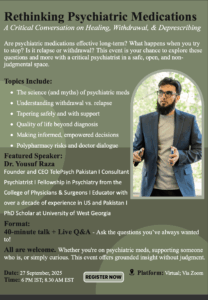
Mad in South Asia presents Rethinking Psychiatric Medications – A Critical Conversation on Healing, Withdrawal, & Deprescribing
September 27th 2025 1.30 pm BST (6 pm IST)
Format
A 40-minute talk followed by an extended Q&A session, where you can ask your own questions about psychiatric meds, alternatives, and what recovery can look like.
Have you ever wondered: Do psychiatric medications really work? How long should you stay on them? Are withdrawal symptoms just part of the illness coming back—or something else entirely?
This event invites you into a candid, evidence-based conversation that challenges mainstream narratives around psychiatric medications. Whether you’re currently taking meds, supporting someone who is, or simply curious, this is a space for asking the difficult questions that rarely get asked in traditional healthcare settings.
Led by a critical psychiatrist, this session explores deprescribing—the careful, informed process of reducing or stopping psychiatric medications when they no longer serve your wellbeing.
What You’ll Learn
- What science tells us (and doesn’t tell us) about long-term use of psychiatric medications
- How to distinguish between withdrawal symptoms and relapse
- The importance of gradual tapering and psycho-social support
- Why recovery is about more than just symptom management
- Navigating the healthcare system and advocating for yourself
- Understanding the “dignity of risk” and making informed, personal choices
- Risks of polypharmacy and how to have better conversations with providers
